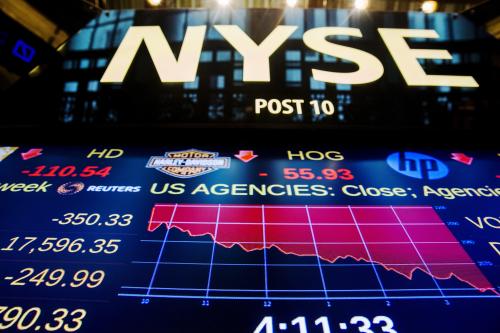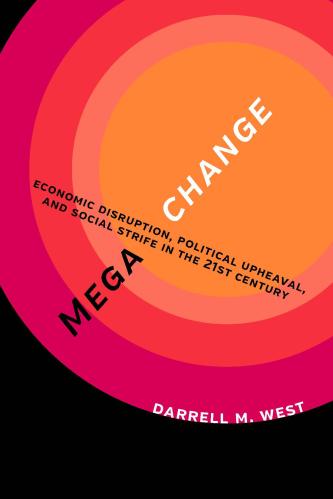The 2016 election produced another shocker for the world with the presidential victory of Donald Trump. Following on the heels of many other surprises in recent years such as the Great Recession, the rise of ISIS, Brexit, and Trumpism itself, it demonstrates that many of the forces that used to constrain change are weak and the world is in an era of large-scale transformation.
In my book Megachange: Economic Disruption, Political Upheaval, and Social Strife in the 21st Century, I argue that contemporary change has sped up and produced many unexpected developments. Seemingly settled issues such as globalization and international alignments now are back on the table with considerable uncertainty regarding how each of them will unfold in the future.
Amidst all these changes, the good news is that this is not the first time America has confronted megachange. In the 1850s and 1860s, the United States struggled with the moral and economic ramifications of slavery. However, it took a Civil War to resolve that issue.
In the early 20th century, the nation confronted powerful challenges as it moved from an agrarian to an industrial order. Families left the farms for mass production factory jobs. They had to adapt to a new means of production and a different way of life in the cities. In addition, there was widespread corruption and cronyism that made it difficult for political leaders to address people’s concerns.
Other than the scattered violence associated with anti-union forces, anarchists, and nativist movements, though, the system made major policy adjustments that dealt with the underlying tensions. Leaders such as Theodore Roosevelt strengthened regulation of railroads and large trusts, and enacted much-needed food and safety requirements. They created a system of national parks that improved the leisure time of working Americans. They sought more open government that was responsive to people’s concerns.
The international order also was in chaos following World War II. European and Asian economies were shattered, and governments weakened around the world. Millions lay dead amidst one of the most horrific conflicts in human history, and many others faced poverty and unemployment.
Yet far-sighted leaders developed a Marshall Plan that helped former adversaries get back on their feet. A bipartisan foreign policy supported new global institutions such as the World Bank and International Monetary Fund designed to help other nations. Leaders from different parties worked together to deal with the threat of communism. The constructive foreign and domestic policy restored prosperity to many places in the world and positioned the United States for global leadership.
Today, both the United States and the globe as a whole face equally formidable challenges. There is a backlash against globalization and many Americans feel that trade deals are bad for average workers. Current levels of income inequality have limited mobility and stymied social advancement. The rise of technology change has disrupted many different sectors and accentuated economic anxiety. Racial tensions have been exacerbated by the inequity that people experience.
Crucial to the resolution of our current difficulties is far-sighted leadership. We need to deal with anxieties caused by the structural shifts to a digital economy. As demonstrated by the strong support for candidates Donald Trump and Bernie Sanders, workers are concerned about being left behind and they need to get training to develop the skills needed for 21st century jobs. We must ensure that globalization performs well for workers of limited education and that we address issues related to income inequality, loss of social mobility, and racial disparities.
Forward-looking leaders from the last century correctly gauged that America was at a fulcrum that could go in a variety of different directions. They developed policies that resolved underlying tensions and restored the American Dream. Our governing processes enabled people to debate alternatives, take decisive action, and resolve societal tensions.
It is an open question whether the new Trump administration and a Republican-controlled Congress will govern in a forward-looking and bipartisan spirit. They have the opportunity to listen to the angry workers who feel left behind and address their economic concerns. They need to understand there are long-term tensions arising from the shift from an industrial to digital economy. There is profound public mistrust that will make it difficult for anyone to unify the country. If leaders in each party don’t figure ways to deal with the anger and anxiety generated by megachange, they will face scenarios far more frightening and destructive than what transpired this year.
Note: Darrell M. West is vice president of governance studies at the Brookings Institution and author of Megachange: Economic Disruption, Political Upheaval, and Social Strife in the 21st Century.









Commentary
Stunned again by megachange
November 9, 2016